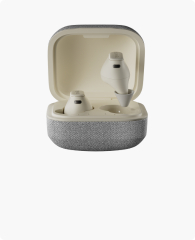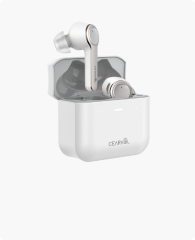Musical Ear Syndrome (MES) is a condition where individuals perceive music or melodies without an external source. It's often compared to auditory hallucinations, but it's not linked to psychiatric disorders. In this guide, we'll explore what causes musical ear syndrome, its symptoms, and potential treatments.
🚀 Navigate This Post
You may also be interested in:
- Tinnitus and Hearing Loss: What's the Connection?
- Connect Hearing Aids to Bluetooth in Seconds
- Comprehensive Guide: Everything You Need to Know about Hearing Aids
Part 1: Understanding Musical Ear Syndrome
Musical Ear Syndrome primarily affects individuals with hearing loss or auditory impairments. The brain, in response to reduced auditory input, creates phantom sounds, which often resemble faint music or melodies. This phenomenon raises the question, "Why do I hear faint music at night?"
1. Common Causes of Musical Ear Syndrome
-
Hearing loss: The most common trigger for MES, as the brain compensates for missing auditory signals. When auditory input decreases, such as in individuals with hearing loss, the brain may "fill in the gaps" by generating sounds like music or melodies.
-
Medications: Certain medications with ototoxic effects may contribute to auditory hallucinations. For a detailed list of drugs that cause musical ear syndrome, consult with a healthcare professional.
-
Stress or sleep deprivation: High levels of stress, anxiety, or lack of sleep can exacerbate symptoms by heightening sensory perceptions. Emotional distress might amplify the perception of phantom music.
-
Tinnitus: Often considered a precursor to MES, tinnitus involves the perception of ringing or buzzing in the ears. In some cases, these sounds evolve into musical patterns.
-
Neurological conditions: Disorders such as Parkinson's disease, epilepsy, or Alzheimer's disease can impair the brain's auditory processing, potentially triggering MES.
-
Social isolation: Prolonged periods of isolation, particularly in older adults, may increase susceptibility to internal auditory experiences like MES.
-
Cognitive decline: Age-related cognitive changes or dementia can lead to brain misfiring, resulting in MES.
-
Ear infections or blockages: Physical issues like infections or wax buildup may distort auditory signals, causing phantom sounds.
-
Brain injuries or tumors: Damage to the brain's temporal lobe or other auditory-processing areas may result in MES.

2. Symptoms of Musical Ear Syndrome
- Perception of non-existent music or melodies.
- Occurrence often in quiet environments or at night.
- No external auditory source can be identified.
Musical Ear Syndrome is not dangerous, but many wonder, "Is musical ear syndrome serious?" While it's typically benign, addressing the underlying causes, such as hearing loss, is crucial.

Part 2: Diagnosing Musical Ear Syndrome
If you've experienced symptoms of MES, a musical ear syndrome test can help identify potential triggers.
1. Evaluation by a Hearing Specialist
A specialist will assess your hearing levels and look for underlying conditions like tinnitus or hearing loss. They might recommend the best OTC hearing aids, which can enhance sound clarity and reduce phantom noises.
2. Medical History Review
Understanding your medication and health history can help identify if MES is linked to specific drugs.

Diamond X1 - Best Hearing Aids with Bluetooth
Newcomer Price
$249.99 $309.99
- ✔ Adaptive sound modes for clear hearing.
- ✔ Bluetooth for calls & streaming.
- ✔ App-controlled, customizable adjustments.
- ✔ Rechargeable & fast charging.
- ✔ Ideal for mild to moderate hearing loss.
Part 3: Effective Treatments for Musical Ear Syndrome
Can musical ear syndrome go away? While there's no guaranteed cure, several treatments can help alleviate symptoms:
1. White Noise Therapy
Using devices or apps to play white noise can mask phantom sounds. Learn more about the benefits of white noise and how it aids relaxation. Additionally, incorporating sound therapy like nature sounds or low-level background music may enhance results.
2. Treating Hearing Loss
Hearing aids, such as Cearvol OTC hearing aids, are designed for individuals with mild to moderate hearing loss, enhancing sound clarity and supporting a more balanced auditory experience. Some users have reported that improved external sound input may help them focus less on internal noises associated with MES. For those with more significant hearing challenges, cochlear implants could be an option to enhance sound perception.
3. Cognitive Behavioral Therapy (CBT)
CBT assists individuals in managing the emotional toll of MES by reframing their psychological responses to phantom sounds. Combined with relaxation techniques like mindfulness or meditation, it can significantly reduce the impact of MES on daily life.
4. Tinnitus Management
Effective tinnitus management can play a role in alleviating MES. This includes sound therapy options such as white noise machines, nature sounds, or low-level background music to mask phantom sounds. Additionally, tinnitus retraining therapy (TRT) combines counseling and sound therapy to desensitize the brain to phantom sounds, further reducing their impact.

5. Stress and Anxiety Reduction
Since stress is a common trigger for MES, adopting stress management techniques can be beneficial. Practices like meditation, mindfulness, yoga, and deep breathing exercises are known to reduce stress levels. Ensuring adequate sleep is also crucial, as sleep deprivation can exacerbate auditory hallucinations.
6. Medication Adjustments
For MES caused by medications, consulting with a healthcare professional to adjust dosages or explore alternative drugs is essential. In some cases, antipsychotic or anti-anxiety medications might be prescribed to help mitigate symptoms.
Part 4: Preventing Musical Ear Syndrome
While MES isn't always preventable, these tips can help reduce the risk:
1. Manage Hearing Loss
Regular hearing checks and using devices like the best bluetooth rechargeable hearing aids can help maintain auditory health.
2. Limit Noise Exposure
Avoid prolonged exposure to loud environments to reduce the risk of hearing loss and MES.

3. Monitor Medication Use
Be aware of the list of drugs that cause musical ear syndrome and consult your doctor about alternatives if you experience symptoms.
Part 5: When to Seek Professional Help?
Sometimes, MES symptoms may require medical attention. Consider consulting a specialist if:
- Symptoms persist despite treatment.
- MES disrupts daily life or sleep.
- There are additional symptoms like dizziness, severe tinnitus, or hearing loss.
Addressing concerns early ensures better management of musical ear syndrome treatment and underlying conditions.
Conclusion: Improving Your Hearing Health
Musical Ear Syndrome, while intriguing, can be distressing for those who experience it. By understanding what is musical ear syndrome, its causes, and treatment options, you can take proactive steps toward relief. Enhance your auditory experience with advanced tools and explore the role of verbal communication in improving quality of life.








Leave a comment
All comments are moderated before being published.
This site is protected by hCaptcha and the hCaptcha Privacy Policy and Terms of Service apply.